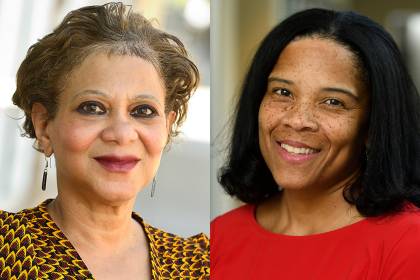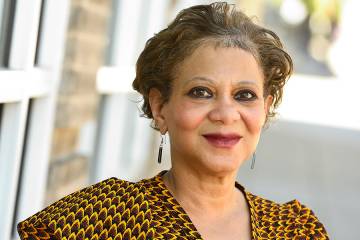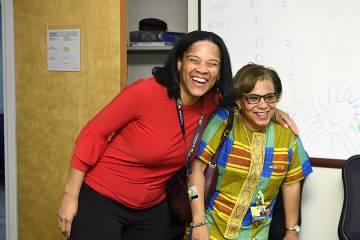With more than $20 million in funding from the National Institutes of Health, a new center led by two Johns Hopkins researchers will work to address cardiometabolic health disparities among socially disadvantaged populations across Maryland.

Image caption: Lisa Cooper and Deidra Crews
Image credit: Will Kirk / Johns Hopkins University
The Mid-Atlantic Center for Cardiometabolic Health Equity, or MACCHE, is steered by Bloomberg Distinguished Professor Lisa Cooper, a pioneering researcher of health disparities, and Deidra Crews, a professor of medicine and national leader in the study of chronic kidney disease. The effort marks a novel partnership between the Johns Hopkins Center for Health Equity and the University of Maryland Baltimore, in collaboration with Morgan State University and other local institutions.
With multiple socially disadvantaged populations defined by race, ethnicity, socioeconomic status, and geography, the state of Maryland provides an ideal setting for examining the health disparities associated with cardiometabolic health, the researchers say. Cardiometabolic disorders—including hypertension, obesity, diabetes, heart failure, and kidney disease—are among the leading causes of morbidity and mortality in the United States and in Maryland.
The goal of MACCHE is to test the effectiveness of several evidence-based strategies for improving cardiometabolic health outcomes among disadvantaged populations, using community-based and patient-centered research principles that may be translated into clinical and public health practices.
The MACCHE team, which includes researchers from the Johns Hopkins schools of Medicine, Nursing, and Public Health, were notified last week of their P50 Center Grant award of $20,488,352 from the National Institute on Minority Health and Health Disparities.
"With a focus on multiple chronic diseases, we will be able to test interventions that address disparities in health conditions that tend to co-occur and share some of the same prevention strategies and treatments," Crews says. "I am excited about the new and established collaborations of our team, and the opportunity to partner with Dr. Cooper in leading this work."
MACCHE consists of three research programs, spanning several locations in Maryland:
- Healthy for Two/Healthy for U, focusing on maternal and infant health, will assess the effectiveness of health coaching and home-visit interventions in reducing postpartum weight retention among high-risk Black and Latinx women. Principal investigators Kelly Bower and Wendy L. Bennett
UNLOAD Heart Failure will examine community-based interventions for improving cardiorespiratory fitness in adults of low socioeconomic status across urban, rural, and suburban settings. Principal investigators Chiadi Ndumele and Lisa Cooper
LINKED-HEARTS focuses on improving team-based care for blood pressure control among socially disadvantaged adults with uncontrolled hypertension plus diabetes or chronic kidney disease. Principal investigators Yvonne Commodore-Mensah and Cheryl Dennison-Himmelfarb
The research team also includes core leads Mary Catherine Beach and Tanjala Purnell in investigator development, and Chidinma Ibe and the Rev. Debra Hickman in community engagement.
"The award provides opportunities for us to expand the scope of Center for Health Equity's research and to elevate our influence and impact on advancing health equity in Maryland," Cooper says. "In addition to launching three new intervention studies, we'll have resources to increase the leadership of our community partners in governance of the center and to enhance mentoring of scientists conducting disparities research in our region. I am thrilled to be co-leading this effort with Dr. Crews."
Posted in Health, University News
Tagged lisa cooper, nih funding, health, deidra crews









